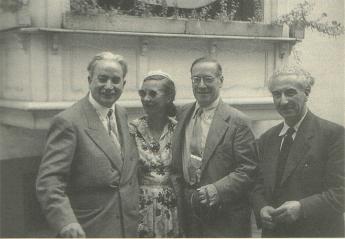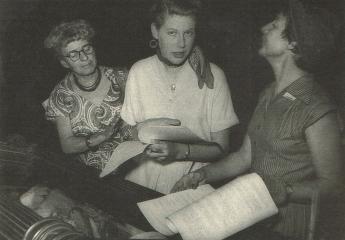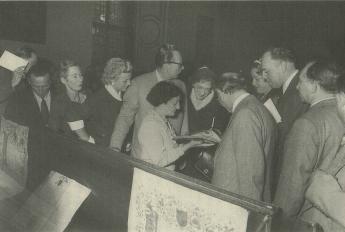Copenhagen 1948

By Barbara Kaye Muir
The International League of Antiquarian Booksellers¾ILAB to English-speaking members, LILA to the French-speaking¾came into being the following day. Its constitution, drawn up by the ten presidents, was approved by the general assembly, its officers and executive committee duly elected. Its birth had not been easy, the labor had been protracted, and it would suffer growing pains for years to come; but it was a wanted child, and the Danes saw to it that its christening was suitably celebrated.
When Menno Hertzberger proposed William Kundig for president, it was Percy who seconded. He believed that Kundig, a man with authority, position, and money, from a neutral country, was the right choice. He certainly had no wish to take on the job himself. As he wrote some years later: "I did not take to Kundig. He was a boaster ... and he enjoyed bullying. He boasted that he was King of the Black Market; but it is fair to say that the laws he broke were not Swiss laws and his good humor was impenetrable... ."
Despite reservations about Kundig’s character, Percy got along with him pretty well, not least because he was a good host and a first-class raconteur. His election as president was unanimous and was followed by the Dutch proposal for Percy as vice president. Hertzberger was then elected honorary treasurer, with André Poursin and Einar Grónolt Pedersen making up the executive, the latter representing the Scandinavian countries.
The fact that the league was starting life with no money in hand had largely been ignored in the discussions. That funds should be provided by member associations (those with memberships of more than 150 would pay double) had been agreed, but that did not mean that funds were instantly available, especially in view of the stringent currency regulations then operating in many countries in Europe. Switzerland, without such problems, was clearly the best place for the funds to be held, as Kundig pointed out. He followed this with a typically grand gesture: So that the work of the International League could begin straight away, he would personally loan it the necessary funds.
Meanwhile, the Danes, anticipating a happy conclusion to the morning’s discussion, had tipped off the press. Informed by a Danish delegate, Mr. Friis, that they were waiting to hear the good news, Percy announced an adjournment "to mark this great occasion," both to celebrate and to see that the press was fully informed of what had been achieved. "Spread the news in your own countries," he told the delegates. "Governments can do a lot for us if they will, and governments are very sensitive as to what appears in the press...we hope, too, that one result of this conference and the formation of the league will be to persuade the booksellers who have no national association to form one."
Ten associations, including the reluctant ABA, made an excellent start. Percy had no doubt that more would be formed and would join. There had, in fact, been an American observer at the Amsterdam conference.
There had already been some coverage of the conference in the Danish press; with the formation of the league we found ourselves a media event. Not only was Percy interviewed at the conference hall, the following morning an eager young reporter turned up at our hotel and insisted on talking to Percy while we were breakfasting in our bedroom, not a time when I was keen to be photographed. There had been a party the night before; I felt far from my best, but there was no escape from the press photographer.
"He’s made me look like Eleanor Roosevelt," I grumbled crossly when the story appeared the next day above a lot of unintelligible Danish from which I disentangled something about novelist wife of conference chairman, Mr. Percy Muir. But our Danish hosts were delighted with all the publicity and even more so with the increased volume of books sold during the conference week.
Among the various invitations and publicity material awaiting us (and all the other delegates) when we arrived in Copenhagen had been one for a soirée at Branners, the bookshop under the direction of that same Hans Goetz who had haunted the Amsterdam conference and was still being cold-shouldered by the Danish association. While diplomatically refraining from embarrassing the British by turning up at the conference as a member of the ABA, he was not going to be overlooked on his home ground.
"I think we should go," Percy said. "I don’t want to upset the Danes, but after all we’ve nothing against Goetz; in fact, he has behaved very well. It will be interesting to see who else is there."
The party took place in the large and elegant showroom of the Branner premises. Looking around, it was clear that apart from the Scandinavians, pretty well all the other countries were represented, their delegates feeling, as we did, that it was not their quarrel. Suave and smiling, Hans Goetz and his vivacious wife moved among their guests murmuring their appreciation of the support of so many friends and colleagues. "We have been so looking forward to meeting our friends from other countries. It is a difficult time for us, you understand...."
Glasses were filled and refilled. The atmosphere was cordial. Surrounded as we were by fine books, some of the guests were moving purposefully along the shelves. No reason, their stooped backs suggested, as they pulled out a volume here and there, that sociability and business should not be combined.
As Percy’s wife I had been introduced to most of the delegates and such wives as were accompanying them. Many of the ladies at the "soirée" seemed to speak only French. All were dauntingly well dressed. As to who was French, or Belgium, or Swiss I had no idea. The few Danish phrases I had managed to memorize had gone down rather well with our hosts and hostesses, who, in any case, mostly spoke good English. In fact, I would have done better to have smartened up my inadequate schoolgirl French, which was going to need considerably more than a brush-up in the years to come.
One morning during our stay, badgered by the children to take them to a swimming bath, I took them to one along the coast. In view of the Danes’ uninhibited attitude to sex, I was surprised to find males and females strictly segregated, with separate baths. I thought this rather illogical, since both baths opened into the sea at the far end, where, presumably, the sexes could mingle as they liked. But perhaps, as by then they would be in deepish water, it was thought unwary females would be safe enough.
Entry into the baths was guarded by a stern dragonwoman who spoke no English. David, small for his eight years, was scrutinized closely before being allowed (something of a concession, I gathered) into the women’s section. The reason for the segregation was clear once we went through the barrier. There, sunning themselves along the side of the bath opposite to the changing cubicles was a group of naked females, disposed on sunbeds and deck chairs, gossiping and nibbling at Danish pastries. None being exactly slim, the scene had a Rubenesque quality.
My children were inclined to stand and stare. Hurrying them into a cubicle, I told them that in the circumstances they could forget about their swimsuits, which would save me having to dry them later. After all, when in Rome...
Helen modestly demurred, said she would wear hers anyway, while David, less inhibited, ran out naked.
I had not reckoned on the dragonwoman. No sooner had he left the cubicle in his birthday suit than she appeared, waving her arms and gabbling indignantly in Danish. The words were incomprehensible, but I got the drift; it was okay for the ladies to display their bodies in the seclusion of the females-only bath, but for even an eight-year-old male it was strictly forbudt. So it was into the cubicle again and on with his bathing trunks.
Back on the edge of the bath at the shallow end, he decided that he wasn’t so keen on a bathe, after all. Having put in a tentative toe, he protested that it was cold. Too cold. My efforts to persuade him that it would be lovely once he was in were to no avail. Exasperated, my patience gave way and, dumping him in the shallows beside the steps, I swam off to join Helen, leaving him yelling lustily in two feet of water.
I had been aware of some hostile glances from the far side of the bath even before I got my son into the water. When I glanced back at him, he had already scrambled out and was being led away by one of the Rubens ladies to join her friends, oiled and gleaming like basking female seals.
"We don’t need to bother about him," said his sister in superior tones, as I wondered aloud if he would join us of his own accord when it was time to leave, or if I would have to go over and wrest him from his lady friends. "I don’t care if they want to keep him."
From time to time I glanced to where David was clearly having a splended time being fed sweet cakes and petted by jolly naked ladies. The dolce vita, indeed. Would he ever forget it? More to the point, would he come away willingly?
When we returned to our cubicle to dress, I called across that it was time to go.
"Farvell, David," said the lady who had enticed him away. "Now you must go to your mother."
Smiles and farewells sent him on his way. Someone gave him an apple. He didn’t hurry. As he rejoined us, there was a glint of triumph in his eyes.
"The lady who was bare was very nice to me," he said.
The business sessions of the conference lasted three days. As well as the actual formation of an international organization, the agenda dealt with problems of payments among countries bedeviled in the aftermath of the war by exchange control laws that inevitably created a black market in currency deals. Then there was the matter of an international black list of bad payers or defaulters, long-windedly termed "a confidential information service concerning solidity." An international directory was to be published, a mammoth task to be shouldered jointly by Percy and André Poursin. This had its plus side, for it would lead to many agreeable Anglo-French meetings, usually in Paris. Those who worked with André could expect to be lunched or dined very well indeed. Unless he decided they were casse-pieds, his term for bores.
It was also agreed that it would be helpful to have an international dictionary of trade terms and descriptions. It was Menno Hertzberger who first put forward this idea, and, as often happens with proposers of bright ideas, he found himself lumbered with carrying it out, which he accepted with no great enthusiasm, although he was promised Danish cooperation. Other problems surfaced, several to crop up again at future meetings, but with most the prevailing atmosphere of good will ensured general agreement.
At the end of the final session, Dudley Massey, with Percy’s and Winnie Myers’ approval, rose to propose that the 1949 conference should be held in London, a proposal accepted with enthusiastic applause. With this invitation the three British delegates had put the ball well and truly in the ABA’s court.
The farewell banquet was a jolly affair, typical of the Danish preference for informality. Instead of having to listen to long speeches, we were invited to sing a song in praise of eggs and bacon, the words of which were printed on Carlsberg beermats. As a gesture to the French, we belted it out to the tune of "Frère Jacques."
I was agreeably placed beside the Danish president, Einar Grónolt Pedersen (Percy’s partner was Einar’s attractive wife). Einar was tall, wore horn-rimmed spectacles, and spoke English and French with an engaging disregard of grammar. In English the French mon cher became "my dear" irrespective of which sex he was addressing. His sense of fun was as irrepressible as his fondness for women, leading André to describe him as pas sérieux. Which was perhaps not altogether fair, for his whole hearted support of the league had been instrumental in bringing in the rest of the Scandinavian countries. Percy had taken to Einar from the beginning, for he was a lovable man. It was a friendship that time would not dim.
When I read the dinner menu, I was aghast at the amount of food we were being offered. Dutch herrings, lobster, prawns, smoked salmon, eel— just for starters; followed by roast duck, turkey, and lamb, with cheese if we were still hungry. To wash it down, there were the Danish national drinks, Carlsberg or Tuborg topped up with aquavit and finally liqueurs. To my apologetic murmur that I would never manage it all, Einar replied, "Eat slowly, my dear. Eat slowly, and you will manage." Somehow I did.
As was to become the tradition at league farewell banquets, the presidents of each country’s association were asked to say a few words in their maternal tongue, once they had paid tribute to their hosts and hostesses in one of the official languages.
Most memorable of the speeches in Copenhagen was one from the grey-haired, rather solemn Ilmari Jorman, who let himself go in a torrent of passionate Finnish oratory. It hardly mattered that none of us understood a word; it sounded splendid. But I did notice that the French were chortling behind their hands as Ilmari sat down to prolonged applause having brought his speech to an end with a ringing cry that sounded like "Kee-piss." A salutation, I supposed. But André, catching Percy’s eye, was heard to murmur: "Quelle question indiscrète!" It was, in fact, the Finnish form of skaal.
Excerpt from Barbara Kaye, Second Impression. Rural Life with a Rare Bookman. Oak Knoll Press 1995. Presented here by permission of Bob Fleck (Oak Knoll Press). Thank you very much.
Read more ILAB's history on this website


